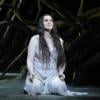
In hard times, making music is especially difficult. In hard times, the need for music is especially acute.
Nonagenarian San Francisco Opera, a year before celebrating its centennial, has faced that dichotomy and challenge successfully since the beginning of the COVID-19 pandemic 18 months ago. The company — management, staff, musicians, donors — somehow kept it together through illnesses and deaths, major financial losses and the uncertainty of a future. Many past productions streamed free, the creation of online material, the drive-in Barber of Seville in Marin, and the recent run of Tosca all added up to meeting the challenge.
All that was missing until tonight was the traditional opening gala, and the “Homecoming” concert served as a stand-in for that. Marking the company’s return from the painful pandemic shutdown and — perhaps coincidentally — the night before the 20th anniversary of 9/11 at the time Afghanistan is constantly in the headlines, an emotional setting was inevitable.

And so, the War Memorial event, telecast live to the SF Giants’ Oracle ballpark, opened with the National Anthem and closed with a medley of two of Broadway’s most sentimental songs, “You'll Never Walk Alone” from Carousel and “Climb Ev’ry Mountain” from The Sound of Music.
The company’s and the country’s endurance might have been better marked with a Fidelio excerpt for the finale, defiant-heroic music both for the occasion and saluting Eun Sun Kim’s canceled 2020 debut and her forthcoming conducting of the Beethoven opera, Oct. 14–30.
For the conductor and soloists Rachel Willis-Sørensen and Jamie Barton there was yet more significance to the evening: they were reunited onstage for the first time since they both sang the 2019 Rusalka, which marked Eun Sun Kim’s War Memorial mainstage debut and the success that prompted her appointment as the company’s fourth music director.

Both Willis-Sørensen, who sang the title role in the Dvořák opera, and Barton, who was the witch Ježibaba two years ago, were in top vocal shape added to impressive onstage presence.
The soprano sang Violetta’s “È strano/ Sempre libera” (How strange/Always free) from La Traviata and “Depuis le jour” (Since the day) from Charpentier’s Louise in the first half, both arias performed with a preternatural combination of lyricism and power.
Barton’s selections were both dramatic and sung with rafter-shaking power: Léonor’s desperate “O mon Fernand” from Donizetti’s La Favorite and Eboli’s “O don fatale” from Verdi’s Don Carlo.
Kim conducted an orchestra that was seated onstage in front of a large acoustic wall with individual microphones overhead for amplification to the ballpark. Unlike the SF Symphony’s seating on risers in Davies Hall, all Opera musicians are seated on one level, which makes second violins, violas, woodwinds, and even the usually prominent brass hard to see from the orchestra level of the Opera House and — as seeing is part of hearing — somewhat attenuated.
Thanks to Kim’s well-proven and constant command of the orchestra, balances were still acceptable, and as usual with her, tempi, accents, cutoffs were impeccable.

And yet, there was something new, except for those who heard her lead the Adlers’ concert in Herbst two years ago: Not only is she an exceptional leader, but also an extraordinary accompanist. With the soloist downstage, behind her back, the conductor inspired a blended sound of voices and instruments, as if all were in front of her and following her baton. A difficult task, admirably accomplished.
The concert’s second half had a perhaps unintended homogeneous nature: aria after aria, duet after orchestral selection shared a kind of languor, although not to the same extent.
The best-case scenario emerged in two duets, one building from apparent calm to an explosion of anger, the other developing in a different way. In “Fu la sorte” (It was fate) from Aida, Barton’s Amneris deceives Willis-Sørensen’s Aida to confess her love for the hero Amneris is certain to have as her own, and she swears vengeance on the slave girl. In “Mira, o Norma” (Look, Norma) from Bellini’s Norma, the subject again is unintended rivalry for a cheating lover, the soprano in the title role and Barton’s Adalgisa finding peace with each other.

The singing was superb in the duets and in the arias as well, but the orchestra’s gorgeous “Moonshine” interlude from Richard Strauss’s Capriccio, Willis-Sørensen’s “Ode to the Moon,” reprising her Rusalka role, and Barton’s slow “Mon coeur s’ouvre à ta voix” (My heart opens to your voice) from Saint-Saëns’s Samson et Dalila — which received the evening’s biggest applause — all conveyed a sense of tranquility.
To exerience Fidelio’s excitement and heroism, audiences will just have to wait a month.




